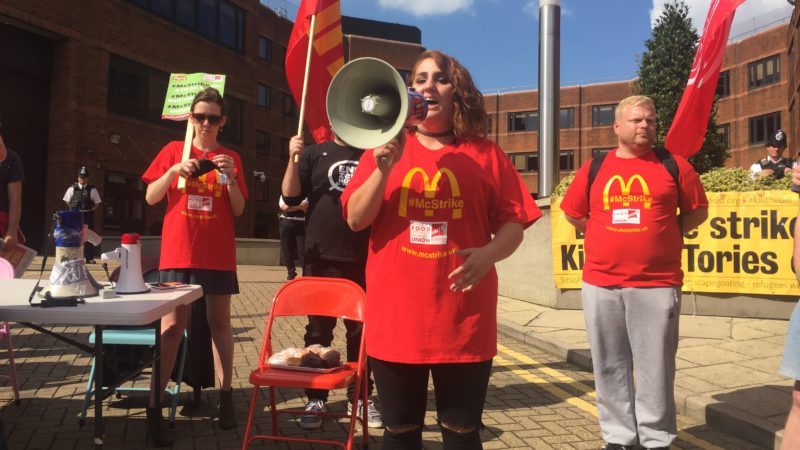Unions are looking to copy the successes of Momentum in recruiting young members.

The TUC unanimously passed a motion today to build union membership amongst gig economy workers and union leaders are promising to ‘get a million precarious workers on the streets’ next year. Is this the beginning of a new trade unionism?
Recognising the successes of the McDonald’s strike and industrial action by other precarious workers around the country, trade union leaders appear to be gearing up for a mass recruitment drive of new members.
The TUC unanimously passed a motion this morning to build a ‘new model of trade unionism’; a ‘transformative project’ that will ‘significantly increase’ trade union membership amongst workers in the gig economy.
At a fringe event at the TUC last night, the head of the Communication Workers Union (CWU), Dave Ward, who’d put forward the motion set out in greater detail the plan to tackle the “gig economy”, “insecure employment” and “in-work poverty”.
“We need a common bargaining agenda”, said Ward:
“There must be things that we should be saying to every employer in this country: we’re not having insecure employment models going forward and we’re going tackle you as an employer if that’s what you do.”
Ward pointed out that “the demographics in our movement are going in the opposite direction than the demographics in the Labour Party”, and said that this had to change if the trade union movement was to survive.
“We need to rejuvenate the movement. And there’s never been a better platform: Corbyn has given us that platform. Our job is to move that platform forward”, he said.
Ward promised to “get a million precarious workers out on the streets, on a trade union platform, fighting for a new deal for workers.”
Tim Roach of the GMB said that his union and others faced “big battles”, explaining:
“We’ve seen casualisation coming in, agency work, bogus self-employment, automation, driverless vehicles. It’s inconceivable that the world of work in 20 years will be anything like what it is now; let alone what it’ll be like in 50 years.”
The union chiefs were in agreement that the Labour Party had flourished in this atmosphere — trebling the party’s membership in two years — whilst unions had stagnated: trade union membership fell by 275,000 in 2016.
“The Labour party have grabbed this opportunity”, said Roach. “And what have the trade unions done alongside? Can we honestly say we’ve been as adaptable and as nimble as the Labour Party?”
Roach and Ward set out their plan to follow and work with the successes of the Labour Party and Momentum in recruiting new, young members — often in precarious work. Social media will be key to this, they said.
A recent video produced about the McDonald’s strike by Momentum, for example, has had nearly 4 million views on Facebook, and data shows that nearly a quarter of the McDonald’s UK work force has viewed it.
Later this afternoon, Labour leader Jeremy Corbyn will use a speech at the TUC to call on young people to join unions.
He’s expected to say: that “the ‘gig economy’ presents itself as modern and dynamic but all too often uses technology as a cover to deny both employees and customers basic protections.”
If unions can start communicating with young workers, engaging with them as Momentum has, and recruiting them like the Labour Party, we could be witnessing the birth of a vibrant new trade union movement.
LFF are covering the whole of TUC Congress – watch this space for updates. Email [email protected] with tips, pitches, or if there’s something we’ve missed.
Left Foot Forward doesn't have the backing of big business or billionaires. We rely on the kind and generous support of ordinary people like you.
You can support hard-hitting journalism that holds the right to account, provides a forum for debate among progressives, and covers the stories the rest of the media ignore. Donate today.




2 Responses to “Unions plan mass recruitment of precarious workers and nationwide action”
patrick newman
Yes dont hang about. Create opportunities for precarious workers to become associates to get some basic advice and information about employment developments and legislation on worker rights. Full TU m,embership would be the next step for associate members. Social media is ideal in linking up people in the gig economy.
UK McDonald's workers are going back on strike | Left Foot Forward
[…] workers in the BFAWU have previously gone on strike three times: starting in September 2017 with two stores, and with two subsequent strikes last […]